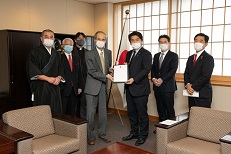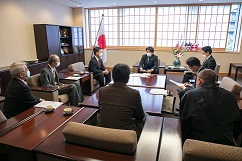
A delegation of World Conference of Religions for Peace (WCRP)/ Religions for Peace (RfP) Japan visited the Japanese Ministry of Foreign Affairs on January 26 and handed a statement issued in response to the entry into force of the Treaty on the Prohibition of Nuclear Weapons (TPNW) to State Minister for Foreign Affairs Eiichiro Washio. The statement urges the Japanese government to sign and ratify the treaty, to review the nuclear deterrence doctrine, and to play a "bridge" role between the nuclear powers and non-nuclear nations toward the abolition of nuclear weapons as the world's only atom-bombed country.
The RfP Japan statement was issued upon the treaty's entry into force on January 22, welcoming the treaty as "a great step forward for humankind toward a ‘world without nuclear weapons’, which the WCRP aims to achieve with all like-minded people," and expressing its "full support” to the treaty.
The statement declares that nuclear weapons are "weapons that must not and cannot be used," and that their "very existence itself is an absolute evil." It calls for their "elimination without a moment's delay.”
The statement also points out that in the process leading up to the treaty's entry into force, the humanitarian approach gave a significant impact on the conventional debate centered on the military balance of the major powers, and "created a substantial disarmament process toward the elimination of nuclear weapons.” The statement appreciates that “the fact that the TPNW, which is directly related to national security, has come to fruition through the joint efforts of the public and private sectors is a powerful opportunity for the formation of future international norms that emphasize a humanitarian approach.”
In the statement, RfP Japan requests the following four points to the Japanese government.
- Japan should sign and ratify the TPNW and become an official signatory.
- Consider that the TPNW and the Nuclear Weapons Non-Proliferation Treaty
(NPT) are complementary, and work in good faith to become a "bridge"
toward the abolition of nuclear weapons.
- Review the credibility of nuclear deterrence doctrine.
- Start to consider Japanese policies to build peace and security that
do not depend on nuclear weapons.

During the meeting, Mr. Washio expressed his recognition of the importance of cooperation between religious leaders and Diet members. He explained the Japanese government's position of promoting nuclear disarmament by strengthening the NPT regime. He said that although Japan's position differs from that of the parties to the TPNW, “the goal is the same,” and expressed his hope to build momentum toward the NPT Review Conference scheduled for August.
Yoshinori Shinohara, Executive Director of the RfP Japan, pointed out that the TPNW was born because the NPT process was stalled. Acknowledging the importance of the NPT, he called for the government to serve as a true "bridge" between the nuclear-weapon states and the parties to the TPNW.
Rev. Kimiaki Tokumasu, a Director of the RfP Japan and the President of the Japan Muslim Association, introduced the Qur'an, which states that if you kill one person, you kill humanity; if you save one person, you save humanity. “The abolition of nuclear weapons is necessary to protect life and the earth. Life is given to us by God. We are obliged to protect our life until we complete it,” he said. He referred to Pope Francis who visited Japan in 2019 and said that nuclear weapons are unethical not only by their use in war but also by their mere possessions.
Rev. Shinichi Yahagi, General Secretary of Nippon Sei Ko Kai, the Anglican Church in Japan, noted that this year marks the 10th anniversary of the nuclear disaster at the Fukushima Daiichi Nuclear Power Plant following the Great East Japan Earthquake. He said that he had learned that nuclear accidents are irreversible. “As a religious leader, I’m questioning if we are not allowed to use nuclear power as an energy source,” he said.
In response, Mr. Washio asked for understanding of the Japanese government's position, saying, "I hope you understand that there is a difficult situation in international politics," but said he would "take the remarks of religious leaders very seriously.”